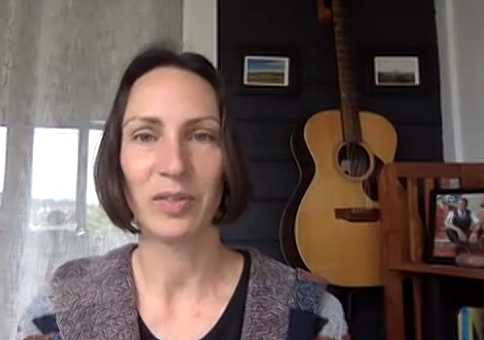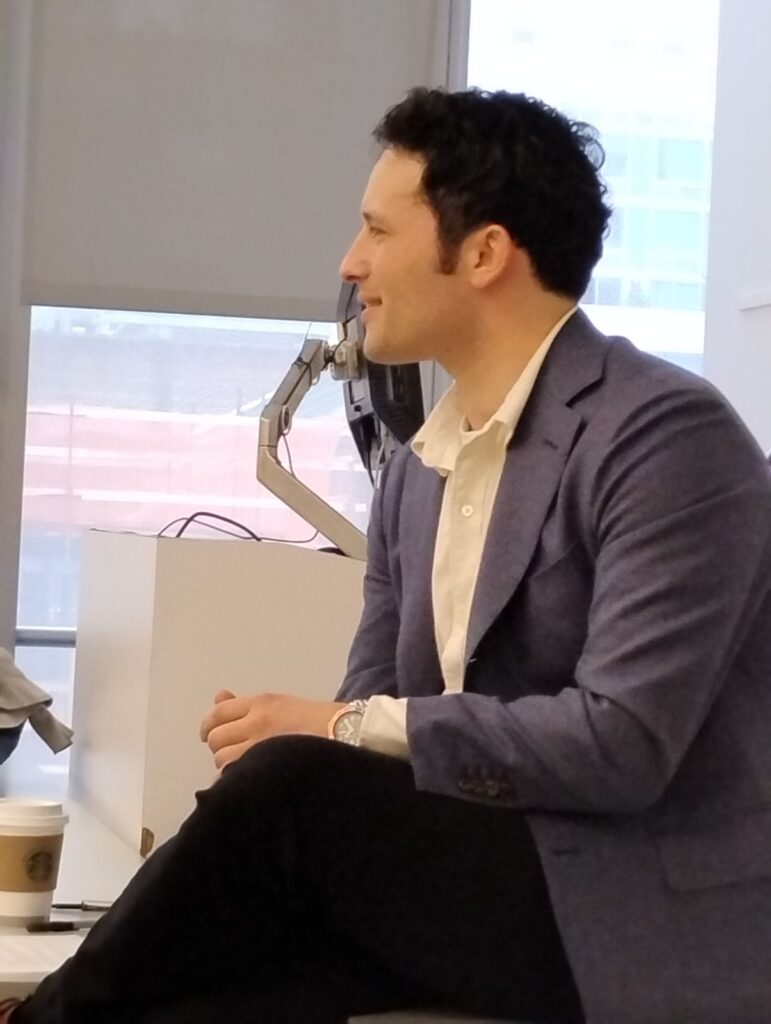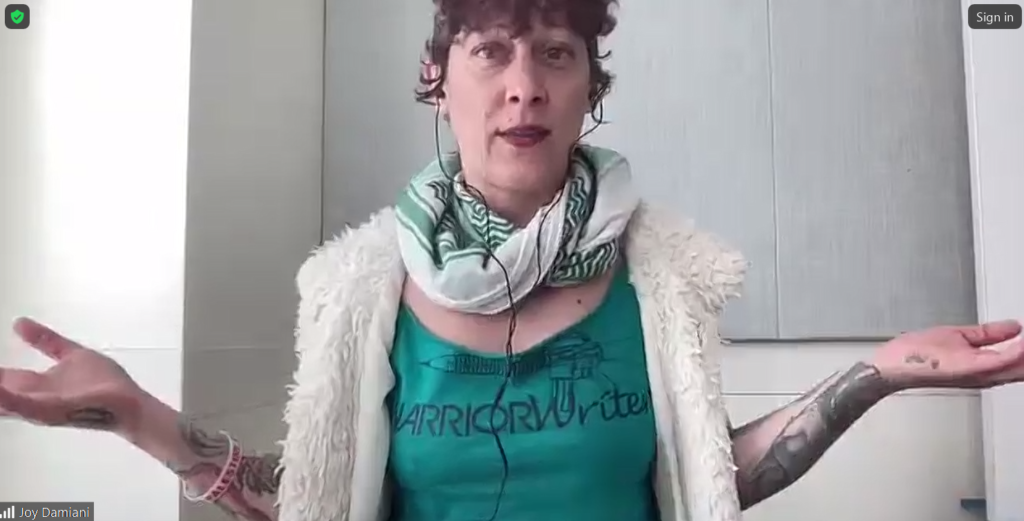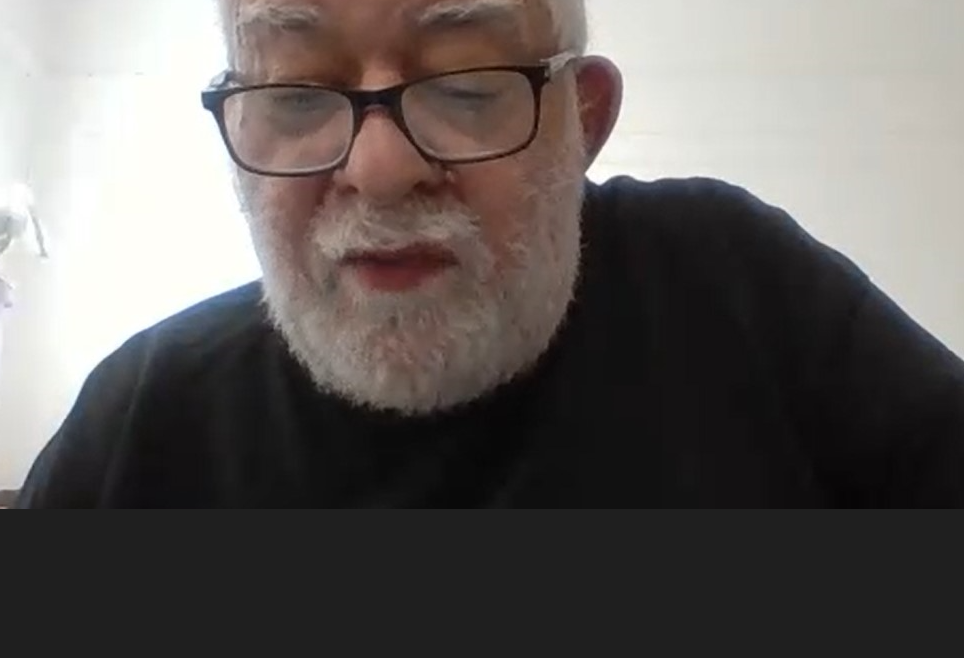
We “traveled” remotely to college classrooms in April — we went to North Carolina and out to Long Island in NY. We also visited in NYC both in-person and remotely.
Both NYC visits were to philosophy classes at a public university.
Rosa del Duca explained how she had joined the National Guard in Montana thinking it would be doing local emergency work, like fighting forest fires, as a useful way to get tuition money so she could attend college.
“As a journalism student, I was paying attention to the (Iraq) invasion and what was going on. And then, as it kept on going on, I started realizing, like oh, we could actually be in a war. I need to think about whether I could fight in a war, whether I could kill someone — all these questions that I hadn’t even considered before signing that contract with the National Guard.
I listened to NPR religiously. And then at the campus radio station I listened to Amy Goodman’s Democracy Now. At my internship I was listening to Rush Limbaugh and Sean Hannity and the more conservative news… They’re like Saddam Hussein has weapons of mass destruction but he didn’t, we couldn’t find them… But then, oh well, just go to war, anyway. A classic case of an unjust war that I really didn’t agree with…
Then all the stories of the soldiers in Iraq and Afghanistan started coming back. They start coming back from their deployments talking about how they were ordered to go house to house and terrorize families… They’re rounding up people and sending them off to these prisons, like Guantanamo and Abu Ghraib…
I just started to feel really morally conflicted about being in an organization that was doing all these things and not even questioning them. At that time the whole world was protesting our involvement in Iraq and Afghanistan.”
Rosa went on to explain how she found out about becoming a conscientious objector, how she went through that long complex process and how she finally got out.

Dean Feinman, who had been a philosophy major at West Point, also spoke to philosophy students introducing his presentation by saying that “patriotism can sometimes be an excessive emotion in our society that leads to nationalism that leads to jingoism and jingoism leads to war.” He noted a first turning point for him was when he began to have questions about the Iraq and Afghanistan wars. When he raised them to a professor, the response was basically “‘Ours is not to question. It’s just to do and die right. We follow orders.’ And that was like the moment where I realized that this ethical conversation is really in a vacuum.”
There was a lot of discussion with the students. One student spoke about her uncle who had been stationed in Germany during the war on Vietnam and suffered from PTS including severe psychosis and alcoholism. He was shipped back home and pretty much abandoned, telling her later, “They don’t really care. They just want to break you down and build you up again, and if you can take it you can take it, it’s like a numbers game to see who can take it.” Dean responded by relating to “Kant and his philosophy. Kant says you should never use a person as a means in and of themselves. And that’s what the military is like. You are a means to them, and they really don’t care about you insofar as your individual contribution, except for the fact that in totality all these contributions are necessary. So you are a means to an end for the military.”

Joy Damiani presented to Long Island women’s studies students at a community college. They had already read two chapters from her memoir, If You Ain’t Cheatin’, You Ain’t Tryin’ and Other Lessons I Learned in the Army. Joy shared with them how she had enlisted with the hope of becoming a journalist but realized her job was that of a propagandist for the war. She told about witnessing the destruction of the “cradle of civilization” caused by the U.S. invasion. Many of the students’ questions centered on gender issues in the military.

Joe Urgo spoke with three North Carolina community college classes studying social psychology. During the presentations he showed a clip from a video of the original Winter Soldiers hearings which he had helped organize.
The students wrote reflections on their reactions to the visit. For example, one student said, “I think the way he presented it and talked about the topic was amazing. He really set how the war was from a different perspective. I learned so much more from him than I have from my teachers!!” Here are a few other statements. You can read more on our Excerpts from Student Papers page.
- What was truly heartbreaking was to hear all the terrible things and forms of torture that they had to witness and to know that this is still going on, and so many of us live in oblivion to it. This makes me be more aware that we should try to get involved with organizations and movements that pertain to go against these acts and give out support in the ways that we can….
- Today we had a retired and disillusioned Air Force vet who had served in Vietnam come speak to our psych class… I know that war is always awful, and that so much of it involves dehumanizing the “enemy”, but had never done much research into Vietnam particularly, other than the watered-down stuff we had learned in school. It makes me think of Gaza, and all the horrors that are surely happening there as we speak. I’ve seen glimpses on social media and it always makes me feel very helpless… I don’t know if we can save this country, or its military, but I really like what our speaker said today, when someone asked for advice for anyone wanting to join – ”Keep your conscience.” It’s incredibly easy to get swept up in the group mentality, even if it’s an evil one. I know that a military is important and necessary, but I would like to hope that one day it will serve its people, and not its leaders’ imperialistic schemes. That of course requires a change in the government as well, and I don’t know how likely it is. Yet as each generation rises, I do get a little more hopeful. My only wish is that we do not die in the darkness, but light that hope in others so that we may forge the world we wish to see.
- I like that this organization is bringing light to what war is really like. Most things you see about war are extremely under-exaggerated and have a lot of things cut from them. So much of the truth about many of the wars in the world is kept from the people. Many things like movies and shows glorify war. I also like the fact that we got to hear more than one person talking about their experiences during the time they served. I really think that more need to know the truth about war and its effects on the soldiers, their families, civilians, and the environment.

